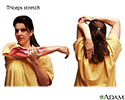Muscle cramps
Cramps - muscle
Muscle cramps are when a muscle gets tight (contracts) without you trying to tighten it, and it does not relax. Cramps may involve all or part of one or more muscles.
The most commonly involved muscle groups are:
- Back of the lower leg (calf)
- Back of the thigh (hamstrings)
- Front of the thigh (quadriceps)
Cramps in the feet, hands, arms, abdomen, and along the rib cage are also very common.
Muscle cramps are common and may be stopped by stretching the muscle. The cramping muscle may feel hard or bulging.
Considerations
Muscle cramps are different than muscle twitches, which are covered in a separate article.
Causes
Muscle cramps are common and often occur when a muscle is overused or injured. Working out when you have not had enough fluids (dehydration) or when you have low levels of minerals such as sodium, potassium, or calcium can also make you more likely to have a muscle spasm.
Muscle cramps can occur while you play tennis or golf, bowl, swim, or do any other exercise.
They can also be triggered by:
- Alcoholism
- Hypothyroidism (underactive thyroid)
- Kidney failure
- Medicines
- Menstruation
- Pregnancy
Home Care
If you have a muscle cramp, stop your activity and try stretching and massaging the muscle.
Heat will relax the muscle when the spasm begins, but ice may be helpful when the pain has improved.
If the muscle is still sore, nonsteroidal anti-inflammatory medicines can help with pain. If the muscle cramps are severe, your health care provider can prescribe other medicines.
The most common cause of muscle cramps during sports activity is not getting enough fluids. Often, drinking water will ease the cramping. However, water alone does not always help. Salt tablets or sports drinks, which also replenish lost minerals, can be helpful.
Other tips for relieving muscle cramps:
- Change your workouts so that you are exercising within your ability.
- Drink plenty of fluids while exercising and increase your potassium intake (orange juice and bananas are great sources of potassium).
- Stretch to improve flexibility.
When to Contact a Medical Professional
Contact your provider if your muscle cramps:
- Are severe
- Do not go away with simple stretching
- Keep coming back
- Last a long time
What to Expect at Your Office Visit
Your provider will examine you and ask questions about your symptoms and medical history, such as:
- When did the spasms first begin?
- How long do they last?
- How often do you experience muscle spasms?
- What muscles are affected?
- Is the cramp always in the same location?
- Are you pregnant?
- Have you been vomiting, had diarrhea, excessive sweating, excessive urine volume, or any other possible cause of dehydration?
- What medicines do you take?
- Have you been exercising heavily?
- Have you been drinking alcohol heavily?
Blood tests may be done to check for the following:
- Calcium, potassium, or magnesium metabolism
- Kidney function
- Thyroid function
Pain medicines may be prescribed.
References
Gómez JE, Chorley JN, Martinie R. Environmental illness. In: Miller MD, Thompson SR. eds. DeLee, Drez, & Miller's Orthopaedic Sports Medicine. 5th ed. Philadelphia, PA: Elsevier; 2020:chap 21.
Wang LH, Lopate G. Muscle pain and cramps. In: Jankovic J, Mazziotta JC, Pomeroy SL, Newman NJ, eds. Bradley and Daroff's Neurology in Clinical Practice. 8th ed. Philadelphia, PA: Elsevier; 2022:chap 29.
Chest stretch - illustration
Chest stretch
illustration
Groin stretch - illustration
Groin stretch
illustration
Hamstring stretch - illustration
Hamstring stretch
illustration
Hip stretch - illustration
Hip stretch
illustration
Thigh stretch - illustration
Thigh stretch
illustration
Triceps stretch - illustration
Triceps stretch
illustration
Chest stretch - illustration
Chest stretch
illustration
Groin stretch - illustration
Groin stretch
illustration
Hamstring stretch - illustration
Hamstring stretch
illustration
Hip stretch - illustration
Hip stretch
illustration
Thigh stretch - illustration
Thigh stretch
illustration
Triceps stretch - illustration
Triceps stretch
illustration
Review Date: 7/25/2022
Reviewed By: Linda J. Vorvick, MD, Clinical Professor, Department of Family Medicine, UW Medicine, School of Medicine, University of Washington, Seattle, WA. Also reviewed by David C. Dugdale, MD, Medical Director, Brenda Conaway, Editorial Director, and the A.D.A.M. Editorial team.














